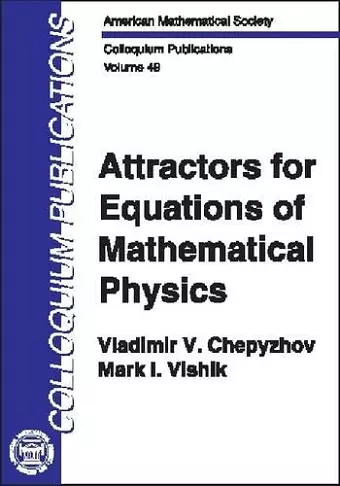Attractors for Equations of Mathematical Physics
Format:Hardback
Publisher:American Mathematical Society
Published:30th Nov '01
Should be back in stock very soon

One of the major problems in the study of evolution equations of mathematical physics is the investigation of the behavior of the solutions to these equations when time is large or tends to infinity. The related important questions concern the stability of solutions or the character of the instability if a solution is unstable. In the last few decades, considerable progress in this area has been achieved in the study of autonomous evolution partial differential equations. For a number of basic evolution equations of mathematical physics, it was shown that the long time behavior of their solutions can be characterized by a very important notion of a global attractor of the equation. In this book, the authors study new problems related to the theory of infinite-dimensional dynamical systems that were intensively developed during the last 20 years.They construct the attractors and study their properties for various non-autonomous equations of mathematical physics: the 2D and 3D Navier-Stokes systems, reaction-diffusion systems, dissipative wave equations, the complex Ginzburg-Landau equation, and others. Since, as it is shown, the attractors usually have infinite dimension, the research is focused on the Kolmogorov $\varepsilon$-entropy of attractors. Upper estimates for the $\varepsilon$-entropy of uniform attractors of non-autonomous equations in terms of $\varepsilon$-entropy of time-dependent coefficients are proved. Also, the authors construct attractors for those equations of mathematical physics for which the solution of the corresponding Cauchy problem is not unique or the uniqueness is not proved. The theory of the trajectory attractors for these equations is developed, which is later used to construct global attractors for equations without uniqueness.The method of trajectory attractors is applied to the study of finite-dimensional approximations of attractors. The perturbation theory for trajectory and global attractors is developed and used in the study of the attractors of equations with terms rapidly oscillating with respect to spatial and time variables. It is shown that the attractors of these equations are contained in a thin neighborhood of the attractor of the averaged equation. The book gives systematic treatment to the theory of attractors of autonomous and non-autonomous evolution equations of mathematical physics. It can be used both by specialists and by those who want to get acquainted with this rapidly growing and important area of mathematics.
ISBN: 9780821829509
Dimensions: unknown
Weight: 994g